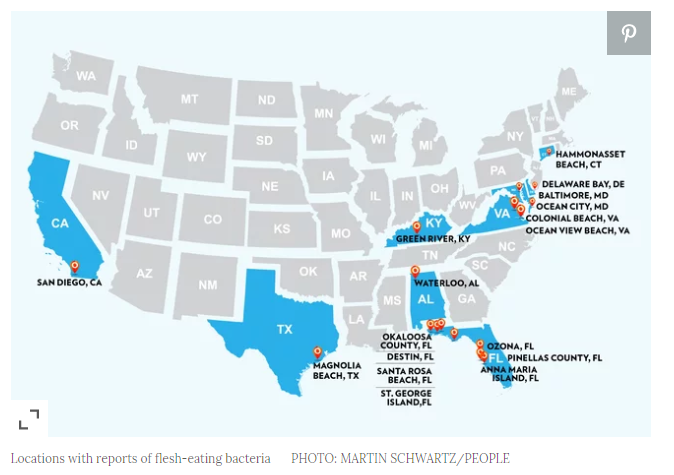What is Flesh-Eating Bacteria?
In dermatology and other realms of medicine, things seem to come and go. This summer we have heard a lot about flesh-eating bacteria on the east coast. Should we be worried about this? This article will attempt to answer all of those burning questions.
What is “flesh-eating bacteria”?
Technically, there isn’t one single bacteria that is “flesh-eating.” The term “flesh-eating” is often commonly using among non-medical professionals to describe a bacterial skin infection that is particularly aggressive in some way. The scientific name is Necrotizing fasciitis, but this is most often caused by Strep bacteria that is not related to wounds and water. Other more rare, but aggressive infections can be caused by bacteria such as Vibrio Vulnificus that is contracted through oyster laden seawater. Other types of bacteria are more common in freshwater. All bacteria grow more in the warm water temperatures of summer.

Is the incidence of flesh-eating bacteria on the rise?
Most scientists say no, but only some types of infections are officially tracked by the CDC and state health departments. The CDC does track cases of vibrio infections yearly. The rise seems to be more media related, but it takes time to see scientific trends. There are also a lot of misdiagnoses.
What are the symptoms I should worry about?
Early symptoms, according to the CDC, are red or swollen areas on the skin that spread, fever, and severe pain that isn’t just in the area of the wound. If these symptoms are present, it is advised to go to the hospital. Other symptoms include ulcers, blisters or black spots, pus or oozing from the wound, dizziness, fatigue, and diarrhea or nausea.
What can I do to prevent obtaining an infection?
Infections enter through openings in the skin. Avoid swimming with an open wound. If an open wound is exposed to warm fresh or seawater, wash thoroughly with antibacterial soap and apply an antibacterial ointment twice a day until the wound is healed. If an infection is suspected, seek medical help immediately.
Have you or someone you know obtained a severe skin bacteria infection from water in WV?
If you know someone who may find this article helpful, please share it with them! Follow us on social media this week, and subscribe to our growing YouTube channel!
If you would like to receive these posts in your email inbox, Subscribe to our Site.
|